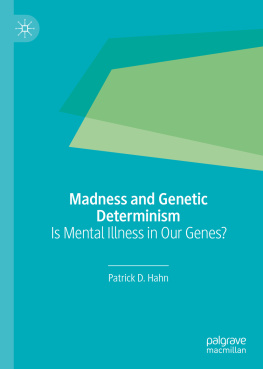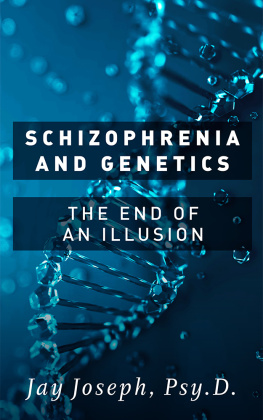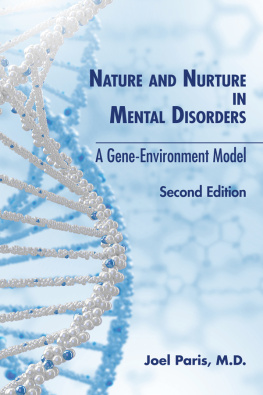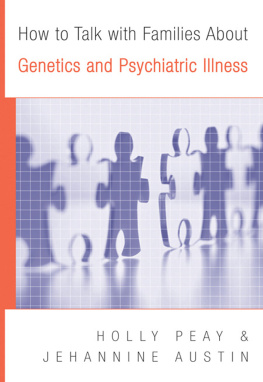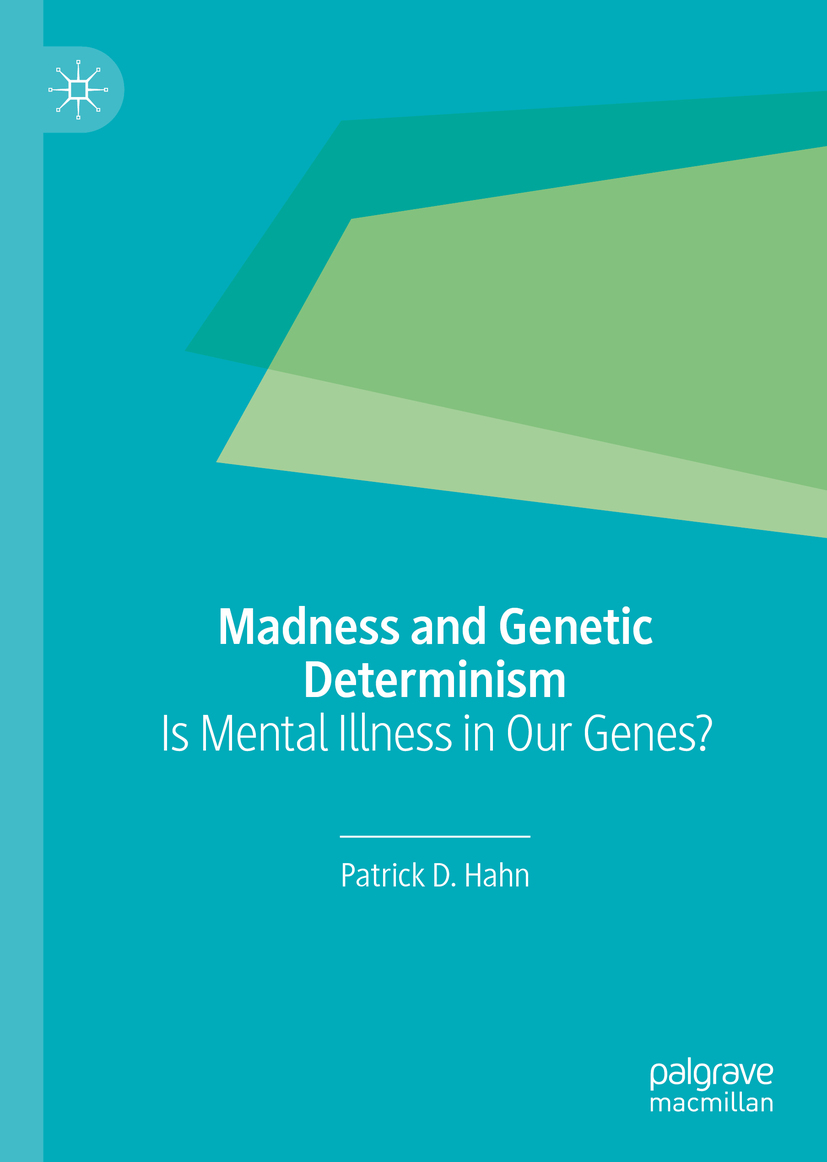Patrick D. Hahn
Madness and Genetic Determinism Is Mental Illness in Our Genes?
Patrick D. Hahn
Biology, Loyola University Maryland, Baltimore, MD, USA
ISBN 978-3-030-21865-2 e-ISBN 978-3-030-21866-9
https://doi.org/10.1007/978-3-030-21866-9
The Editor(s) (if applicable) and The Author(s), under exclusive licence to Springer Nature Switzerland AG 2019
This work is subject to copyright. All rights are solely and exclusively licensed by the Publisher, whether the whole or part of the material is concerned, specifically the rights of translation, reprinting, reuse of illustrations, recitation, broadcasting, reproduction on microfilms or in any other physical way, and transmission or information storage and retrieval, electronic adaptation, computer software, or by similar or dissimilar methodology now known or hereafter developed.
The use of general descriptive names, registered names, trademarks, service marks, etc. in this publication does not imply, even in the absence of a specific statement, that such names are exempt from the relevant protective laws and regulations and therefore free for general use.
The publisher, the authors and the editors are safe to assume that the advice and information in this book are believed to be true and accurate at the date of publication. Neither the publisher nor the authors or the editors give a warranty, express or implied, with respect to the material contained herein or for any errors or omissions that may have been made. The publisher remains neutral with regard to jurisdictional claims in published maps and institutional affiliations.
This Palgrave Macmillan imprint is published by the registered company Springer Nature Switzerland AG
The registered company address is: Gewerbestrasse 11, 6330 Cham, Switzerland
Preface
On the morning of Saturday 28 March 2016, Karina Morales-Rodriguez and Marta Martinez were shot dead outside the MoneyTree retail financial services provider at the corner of South First and East Walnut Streets of Yakima, Washington, where they both worked.
Are people suffering from schizophrenia or any other mental illness really born that way? What does it even mean to say that mental illness is caused by genes? These are the questions we will be considering here.
How we view these conditionsas problems with living, or as brain disorders, probably inheriteddetermines how society deals with persons suffering from them. For the single year 2013, total spending on mental health interventions in the United States exceeded $200 billion. There are literally trillions of dollars at stake here.
The way we view these conditions also touches on some of the most profound questions, such as what kind of society we would like to live in, and what it means to be a human being.
As I researched this book, I came to realize that there actually were two separate stories that needed telling. One was the story of biological psychiatry, with its emphasis on bio-genetic explanations for mental illness and somatic remedies, and the other was the story of humanistic psychiatry, with its emphasis on personal and social causes and remedies. During the past forty or so years humanistic approaches to mental illness have been almost completely eclipsed by bio-genetic ones, but the humanistic approach has never gone away.
I have not attempted to write a comprehensive account of these parallel storiesthat would be an effort requiring many volumesbut I have attempted to tell each of these stories as a more-or-less continuous account, summarizing the work of the main players. At all times I have striven to highlight the human cost of scientific and medical hubris.
One hundred years have elapsed since the establishment of the German Institute for Psychiatric Research, with Ernst Rdin as the Director of Psychiatric and Genealogical Studies. The work of Rdin and his colleagues served as part of the intellectual justification for the T4 Program for the elimination of life unworthy of life, which in turn served as the springboard for the Holocaust.
Of course, nobody is talking about breeding a master race anymore. But as the field of psychiatric genetics enters its second century, with headlines proclaiming on a regular basis that scientists have found the genetic basis of mental illness, it is time to take stock of what we have learned. This is a story of compassionate healers and self-promoting hucksters, of Nazis and monks, of brilliant science and naked corporate greed. Its a story that is now more relevant than ever.
Patrick D. Hahn
Baltimore, MD, USA
Acknowledgments
Grateful acknowledgment is made to each of the following for their assistance in preparing this book:
To the experts who gave so generously of their time to explain their work to me: Peter Breggin , David Healy , Richard Huganir , Jay Joseph , John Read , Jaako Seikkula , and Daniel Weinberger .
To Vickie and Miriam, who courageously shared their stories of iatrogenic harm.
And to my wife and daughter, for their unwavering support.
Contents
Footnotes
Meyers, Donald W, Witness: Man Accused in Two Yakima Killings Was at Store Day Before, Yakima Herald , March 28, 2016, https://www.yakimaherald.com/news/crime_and_courts/witness-man-accused-in-two-yakima-killings-was-at-store/article_f3a525b8-f579-11e5-9a00-dfb710d1ccba.html
Meyers, Donald W. Judge Will Rule Whether Suspect in MoneyTree Double Murder Can Use Genetic Evidence of Mental Illness. Yakima Herald , December 19, 2017, https://www.yakimaherald.com/news/crime_and_courts/judge-will-rule-whether-suspect-in-moneytree-double-murder-can/article_77c21c8e-e54c-11e7-8759-8f470977c163.html
Roehrig, Charles, Mental Disorders Top the List of the Most Costly Conditions in the United States: $201 Billion, Health Affairs , 35, no. 6 (June 2016): 1130.
1. The Beginning
LEnfant Plaza, Washington DC, mid-January, two weeks after the polar vortex brought record-breaking low temperatures to the area. Its a bright clear day, but a bitterly cold wind is stinging my face. Accompanied by my daughter and her friend, I open the door and we enter the United States Holocaust Memorial Museum .
After passing through the metal detectors we enter the cavernous lobby, which is jam-packed with students. A guard passes by, holding a black Labrador retriever at the end of a leash.
We take the elevator to the fourth floor and step out to find ourselves facing an image of skeletons, bits of dried flesh clinging to the bones, all stacked like cordwood outside one of the Nazi death camps. Everyone else around us appears to be of high school age, but the natural exuberance and boisterousness of youth has been put on pause. People speak in hushed tones, or not at all.
We pass exhibits chronicling Hitlers rise to power, then pause in front of a bed frame, its coat of white paint peeling away to reveal the bare metal underneath. Its from the Sachsenberg Clinic, where children were killed by starvation, lethal injections, or overdoses of medication. Behind it is a photomural of the Hadamar Psychiatric Institute, black smoke roiling forth from the chimney.

